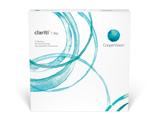
If you’re a woman going through menopause, it may not be the pollen in the air that’s irritating your eyes. According to the Society for Women’s Health Research, more than 3 million women experience dry eye each year due to menopause. But according to a survey of menopausal and perimenopausal women presented at the North American Menopause Society, 96% had dry eye symptoms but only 27% had ever been diagnosed. Dry eyes and allergy eyes have similar symptoms, so it’s important to determine if your allergies are masking a larger problem.
Are your eyes itchy?
The most common indications of dry eye include a burning sensation, a gritty feeling, redness, and sometimes reflex tearing. Allergies can cause redness and tearing too, but the main symptom is itching. Make a note of when the irritation increases. If it’s when pollen counts are high or when a cat is close by, then you’re probably suffering from allergies.
What are your specific symptoms?
Before going to your eye doctor, make a list of detailed symptoms to help with diagnosis. Symptoms can include: burning, stinging, mucus secretion, feeling of something in the eye, swelling of the eyelids or eyes, sensitivity to light, blurred vision, redness, scratchiness/grittiness, itching, tearing, and of course dryness.
How do the treatments differ?
Despite their similarities, dry eye and ocular allergies have different treatments. Dry eye treatment includes treating the glands, the underlying inflammation and using tear lubricants.
Allergy treatments include antihistamine/mast cell stabilizers, artificial lubricants, cool compress and avoidance of allergen.
If you wear contacts and have dry eye or allergies, it’s very important to find the right lens for you. One option you can ask your eye doctor about is CooperVision’s Proclear lenses, which are the only contact lenses on the market to carry the FDA cleared statement, “May provide improved comfort for contact lens wearers who experience mild discomfort or symptoms related to dryness during lens wear.”
Differentiating between allergies and possible dry eye due to menopause can be confusing, especially if you have both! Make sure you talk to your eye doctor to learn more.





